| Listing 1 - 10 of 11 | << page >> |
Sort by
|
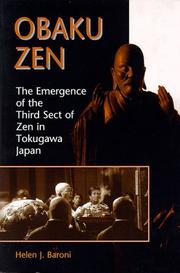
ISBN: 0824822439 9780824822439 Year: 2000 Publisher: Honolulu University of Hawaii press
Abstract | Keywords | Export | Availability | Bookmark
 Loading...
Loading...Choose an application
- Reference Manager
- EndNote
- RefWorks (Direct export to RefWorks)
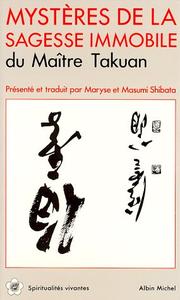
ISBN: 2226029303 9782226029300 Year: 1987 Publisher: Paris Albin Michel
Abstract | Keywords | Export | Availability | Bookmark
 Loading...
Loading...Choose an application
- Reference Manager
- EndNote
- RefWorks (Direct export to RefWorks)
Zen Buddhism --- Martial arts --- J1881.10 --- J1809 --- J1800.60 --- Combat --- Self-defense --- Doctrines --- Religious aspects --- Buddhism --- Japan: Religion -- Buddhism -- Zen -- Rinzai --- Japan: Religion -- Buddhism -- theory, methodology and philosophy --- Japan: Religion -- Buddhism -- history -- Kinsei, Edo, Tokugawa, early modern (1600-1867)
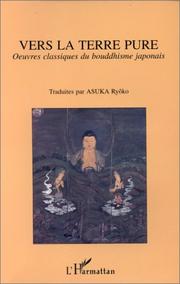
ISBN: 2738423132 9782738423139 Year: 1993 Publisher: Paris L'Harmattan
Abstract | Keywords | Export | Availability | Bookmark
 Loading...
Loading...Choose an application
- Reference Manager
- EndNote
- RefWorks (Direct export to RefWorks)
Book
ISBN: 9780199393138 9780199393121 Year: 2015 Publisher: Oxford Oxford University Press
Abstract | Keywords | Export | Availability | Bookmark
 Loading...
Loading...Choose an application
- Reference Manager
- EndNote
- RefWorks (Direct export to RefWorks)
"In 1654 Zen Master Yinyuan traveled from China to Japan. Seven years later his monastery, Manpukuji, was built and he had founded his own tradition called Obaku. The sequel to Jiang Wu's 2008 book Enlightenment in Dispute: The Reinvention of Chan Buddhism in Seventeenth-Century China, Leaving for the Rising Sun tells the story of the tremendous obstacles Yinyuan faced, drawing parallels between his experiences and the broader political and cultural context in which he lived. Yinyuan claimed to have inherited the "Authentic Transmission of the Linji Sect" and, after arriving in Japan, was able to persuade the Shogun to build a new Ming-style monastery for the establishment of his Obaku school. His arrival in Japan coincided with a series of historical developments including the Ming-Qing transition, the consolidation of early Tokugawa power, the growth of Nagasaki trade, and rising Japanese interest in Chinese learning and artistic pursuits. While Yinyuan's travel has been noted, the significance of his journey within East Asian history has not yet been fully explored. Jiang Wu's thorough study of Yinyuan provides a unique opportunity to reexamine the crisis in the continent and responses from other parts of East Asia. Using Yinyuan's story to bridge China and Japan, Wu demonstrates that the monk's significance is far greater than the temporary success of a religious sect. Rather, Yinyuan imported to Japan a new discourse of authenticity that gave rise to indigenous movements that challenged a China-centered world order. Such indigenous movements, however, although appearing independent from Chinese influence, in fact largely relied on redefining the traditional Chinese discourse of authenticity. Chinese monks such as Yinyuan, though situated at the edge of the political and social arenas, actively participated in the formation of a new discourse on authenticity, which eventually led to the breakup of a China-centered world order"-- "This book tells the story of Chinese Zen master Yinyuan's journey from China to Japan amid the turmoil of the Manchu conquest of China. Despite tremendous difficulties, he persuaded the Shogun to build for him a new monastery (Manpukuji) in Kyoto and founded his own tradition called Obaku"--
J1881.30 --- J1800.60 --- J2296.14 --- Japan: Religion -- Buddhism -- Zen -- Ōbaku --- Japan: Religion -- Buddhism -- history -- Kinsei, Edo, Tokugawa, early modern (1600-1867) --- Asia: Genealogy and biography of East Asia -- China --- Ōbaku (Sect) --- Religion --- History --- History. --- Buddhism --- Zen (see also PHILOSOPHY --- Zen). --- Asia --- China. --- Ingen, --- Ōbaku (sect) --- Zen (see also philosophy

ISBN: 0824824407 0824823583 9780824824402 Year: 2001 Publisher: Honolulu University of Hawaii
Abstract | Keywords | Export | Availability | Bookmark
 Loading...
Loading...Choose an application
- Reference Manager
- EndNote
- RefWorks (Direct export to RefWorks)
Priests, Zen --- Tosui, --- Zen priests --- J1881.20 --- J1800.60 --- J2284.60 --- Japan: Religion -- Buddhism -- Zen -- Sōtō --- Japan: Religion -- Buddhism -- history -- Kinsei, Edo, Tokugawa, early modern (1600-1867) --- Japan: Genealogy and biography -- biographies -- Kinsei, Edo, Tokugawa period, early modern (1600-1867) --- Tōsui, --- Suya Dōzen, --- Tsūnen, --- Unkei, --- 桃水, --- Priests, Zen - Japan - Biography. --- Tosui, - 1605-1683. --- Tōsui
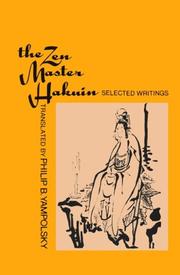
ISBN: 0231034636 9780231034630 0231060416 9780231060417 Year: 1971 Volume: 86 Publisher: New York Columbia university press
Abstract | Keywords | Export | Availability | Bookmark
 Loading...
Loading...Choose an application
- Reference Manager
- EndNote
- RefWorks (Direct export to RefWorks)
An introduction to the teachings of Hakuin and the study of Rinzai Zen.
Zen Buddhism --- J1800.60 --- J1881.10 --- Japan: Religion -- Buddhism -- history -- Kinsei, Edo, Tokugawa, early modern (1600-1867) --- Japan: Religion -- Buddhism -- Zen -- Rinzai --- #SML: Joseph Spae --- S35/1022 --- S35/1026 --- 294.3*96 --- 294.3*96 Zen-boeddhisme --- Zen-boeddhisme --- Japan--Buddhism: sacred texts (incl. commentaries) see also 37/ --- Japan--Buddhist sects: Zen --- Zen Buddhism - Early works to 1800. --- Bouddhisme zen --- Zen Buddhism.
Book
ISBN: 9780674491977 9781684175413 Year: 2014 Publisher: Cambridge Harvard University Asia Center
Abstract | Keywords | Export | Availability | Bookmark
 Loading...
Loading...Choose an application
- Reference Manager
- EndNote
- RefWorks (Direct export to RefWorks)
This book tells the story of Bunchi (1619-1697), daughter of Emperor Go-Mizunoo and founder of EnshMji. Bunchi advocated strict adherence to monastic precepts while devoting herself to the posthumous welfare of her family. As the first full-length biographical study of a premodern Japanese nun, this book incorporates issues of gender and social status into its discussion of Bunchi's ascetic practice and religious reforms to rewrite the history of Buddhist reform and Tokugawa religion.
Buddhist nuns --- Bunchi, --- Enshōji (Nara-shi, Japan) --- History. --- J2284.60 --- J4201.10 --- J1843 --- J1800.60 --- Nuns --- Women Buddhist priests --- Japan: Genealogy and biography -- biographies -- Kinsei, Edo, Tokugawa period, early modern (1600-1867) --- Japan: Sociology and anthropology -- communities -- social classes and groups -- imperial family (kōshitsu) --- Japan: Religion -- Buddhism -- priesthood (priests, monks, nuns) --- Japan: Religion -- Buddhism -- history -- Kinsei, Edo, Tokugawa, early modern (1600-1867) --- Bunchi Joō, --- 文智, --- Enshōji (Nara-shi, Japan) --- 圓照寺 (Nara-shi, Japan) --- 円照寺 (Nara-shi, Japan)
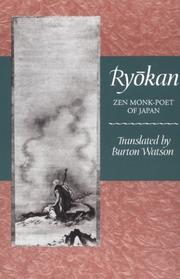
ISBN: 0231044143 0231044151 9780231044141 Year: 1977 Publisher: New York
Abstract | Keywords | Export | Availability | Bookmark
 Loading...
Loading...Choose an application
- Reference Manager
- EndNote
- RefWorks (Direct export to RefWorks)
Asian literature --- Zen poetry, Japanese --- Translations into English --- Ryōkan, --- 294.3*96 --- J5790.60 --- J5500.60 --- J1890 --- J1800.60 --- J1881.20 --- J5710 --- J5770 --- J2284.60 --- Zen-boeddhisme --- Japan: Literature -- poetry -- works by individual poets -- Kinsei, Edo, Tokugawa period, early modern (1600-1867) --- Japan: Literature -- history and criticism -- Kinsei, Edo, Tokugawa period, early modern (1600-1867) --- Japan: Religion -- Buddhism -- literature --- Japan: Religion -- Buddhism -- history -- Kinsei, Edo, Tokugawa, early modern (1600-1867) --- Japan: Religion -- Buddhism -- Zen -- Sōtō --- Japan: Literature -- poetry -- Waka, tanka, chōka --- Japan: Literature -- poetry -- Japanese poetry in Chinese (kanshi) --- Japan: Genealogy and biography -- biographies -- Kinsei, Edo, Tokugawa period, early modern (1600-1867) --- Ryokan --- -Translations into English --- Translations into English. --- 294.3*96 Zen-boeddhisme --- 良寬, --- 良寬 --- Zen poetry, Japanese - Translations into English --- Ryōkan, - 1758-1831 - Translations into English --- Ryōkan, - 1758-1831 --- Ryōkan
Book
ISBN: 9780231158541 9780231530873 Year: 2012 Publisher: New York, NY
Abstract | Keywords | Export | Availability | Bookmark
 Loading...
Loading...Choose an application
- Reference Manager
- EndNote
- RefWorks (Direct export to RefWorks)
Japan in the early 17th century was a wild place. Serial killers stalked the streets of Kyoto at night, while noblemen and women mingled freely at the imperial palace, drinking sake and watching kabuki dancing in the presence of the emperor's principal consort. Among these noblewomen was an imperial concubine named Nakanoin Nakako, who in 1609 became embroiled in a sex scandal. This book recounts the story of this resilient woman.
Buddhist nuns --- Concubinage --- J2284.60 --- J1843 --- J1800.60 --- J4174 --- J4176.80 --- Common law marriage --- Free love --- Marriage --- Marriage law --- Nuns --- Women Buddhist priests --- History --- Japan: Genealogy and biography -- biographies -- Kinsei, Edo, Tokugawa period, early modern (1600-1867) --- Japan: Religion -- Buddhism -- priesthood (priests, monks, nuns) --- Japan: Religion -- Buddhism -- history -- Kinsei, Edo, Tokugawa, early modern (1600-1867) --- Japan: Sociology and anthropology -- family and interpersonal relations -- marriage and divorce --- Japan: Sociology and anthropology -- gender roles, women, feminism -- history --- Law and legislation --- Nakanoin, Nakako, --- Goyōzei, --- Goyōzei Tennō, --- 後陽成, --- Japan --- Court and courtiers --- Nihon --- Nippon --- Iapōnia --- Zhāpān --- I︠A︡ponii︠a︡ --- Yapan --- Japon --- Japão --- Japam --- Mư̄ang Yīpun --- Prathēt Yīpun --- Yīpun --- Jih-pen --- Riben --- Government of Japan --- 日本 --- 日本国 --- Nipponkoku --- Nippon-koku --- Nihonkoku --- Nihon-koku --- State of Japan --- Япония --- Japani --- اليابان --- al-Yābān --- يابان --- Yābān --- Japonsko --- Giappone --- Japonia --- Japonya --- Jepun --- Yapon --- Yapon Ulus --- I︠A︡pon --- Япон --- I︠A︡pon Uls --- Япон Улс
Book
ISSN: 07754612 ISBN: 2960007603 9782960007602 Year: 1997 Volume: v. 28 Publisher: Bruxelles Institut Belge des Hautes Etudes Chinoises
Abstract | Keywords | Export | Availability | Bookmark
 Loading...
Loading...Choose an application
- Reference Manager
- EndNote
- RefWorks (Direct export to RefWorks)
Zen Buddhism --- Rinzai (Sect) --- Bouddhisme zen --- Rinzai (Secte) --- Doctrines --- Early works to 1800. --- Ouvrages avant 1800 --- Early works to 1800 --- J1881.10 --- J1800.60 --- J2284.60 --- S35/1022 --- S35/1026 --- -Zen Buddhism --- -#SML: Chinese memorial library --- Chʻan Buddhism --- Dhyāna (Sect) --- Zen --- Zen (Sect) --- Buddhism --- Mahayana Buddhism --- Buddhist sects --- Linji (Sect) --- Japan: Religion -- Buddhism -- Zen -- Rinzai --- Japan: Religion -- Buddhism -- history -- Kinsei, Edo, Tokugawa, early modern (1600-1867) --- Japan: Genealogy and biography -- biographies -- Kinsei, Edo, Tokugawa period, early modern (1600-1867) --- Japan--Buddhism: sacred texts (incl. commentaries) see also 37/ --- Japan--Buddhist sects: Zen --- -Early works to 1800 --- #SML: Chinese memorial library --- Doctrines&delete& --- Zen Buddhism - Doctrines - Early works to 1800 --- Rinzai (Sect) - Doctrines - Early works to 1800 --- Tōrei, Enji
| Listing 1 - 10 of 11 | << page >> |
Sort by
|

 Search
Search Feedback
Feedback About UniCat
About UniCat  Help
Help News
News